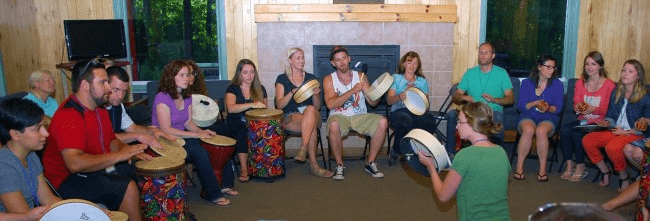We caught up with the brilliant and insightful Miriam Sherk a few weeks ago and have shared our conversation below.
Miriam , appreciate you joining us today. Can you share a story with us from back when you were an intern or apprentice? Maybe it’s a story that illustrates an important lesson you learned or maybe it’s a just a story that makes you laugh (or cry)?
Many years ago I completed my clinical internship training at an in-patient psychiatric hospital in Philadelphia. One unit that I worked on daily was especially difficult — the chronic psych unit. Most of the patients had acute mental illness and a history of violence. At first I was terrified, but it soon became one of my favorite places to be at the hospital. I was really out of my comfort zone and learning and growing constantly.
There was one patient, a young man with schizophrenia, in particular who always stands out to me when I look back on my training. For almost a month he was alone in his room and would not speak to anyone, mostly catatonic and not moving from his chair in the corner. I noticed when I was on the unit and had drums out, however that he would poke his head out and show some interest. I noticed in his hospital file that staff had heard him rapping a bit to himself but other than that he wasn’t speaking to anyone or coming out of his room.
I asked if I could see him individually, which meant going into his room (with security supervision from a behavioral health aide). I dusted off an old drum machine from the 1980s I found in a closet and brought it to his room. I started trying out different beats. At first, nothing. Then, suddenly, without having opened his eyes or aknowledging me in anyway yet, he started free-flow rapping. After almost 2 months of silence in his room he began to rap about himself and how he felt, how scared he was and upset he was in the hospital. I realized that he would talk to me through rapping and music. I joined him in his vulnerability and rapped back in dialogue. His rhymes much more skillful than mine of course, but after three or four weeks of seeing him each day, he started talking to others and coming out of isolation. Music was his bridge back to connection with others and stabilized mental health.

Miriam , love having you share your insights with us. Before we ask you more questions, maybe you can take a moment to introduce yourself to our readers who might have missed our earlier conversations?
I came from a family of musicians and health care practitioners, when I discovered there was a career that overlapped these two worlds I knew it was for me.I received my Bachelor of Music Degree from Blair School of Music at Vanderbilt University in Nashville, TN and my Master of Music Therapy Degree with a focus in clinical mental health counseling from Temple University in Philadelphia, PA. I am now a board-certified music therapist and limited licensed counselor in the state of Michigan.
I have been in clinical practice as a board-certified music therapist since 2012. I have enjoyed a broad focus of practice, working with people of varied needs throughout the lifespan including: neurodivergent and neurotypical children, adolescents and adults seeking emotional and/or behavioral support, as well as older adults with dementia, social/emotional support needs, and end-of-life care. I have provided music therapy services in schools, inpatient and outpatient mental health clinics, community behavioral health programs, memory care units, assisted living facilities, home-based hospice care and a private practice clinical setting.
I practice within a person-centered, strength-based model of music therapy and mental health counseling, using evidence-based music therapy and counseling interventions as tools to guide clients to engage in successful experiences, enhance communication, find space for connection, emotional expression and growth, and learn and practice new emotional and behavioral skills. I meet clients where they are and guide them to connect, express, and thrive to find and live their full potential.
Can you tell us about what’s worked well for you in terms of growing your clientele?
I have learned that spending a lot of energy on traditional marketing strategies was not as effective as simply engaging with and connecting with other mental health professionals, musicians, and others in the well-ness and arts space has been. In a town like Ann Arbor, word-of-mouth recommendations and referrals goes a really long way, much farther than social media or transitional marketing does.

How about pivoting – can you share the story of a time you’ve had to pivot?
During the peak of the pandemic many of us mental health practitioners had more clients than we could take. It was easy to take on more clients than I could realistically manage. However about a year into my private practice I realized building my practice in an intentional way and even shifting to part-time while I had small children was not only ok, it was what felt the best for my own well-being and my family. As an owner of a private practice it’s easy to get caught up in the hustle of continual growth and important to periodically stop and assess priorities for your work and remember your business can change and flex as needed to best suit your needs as the owner.
Contact Info:
- Website: https://www.annarbormusictherapy.com


